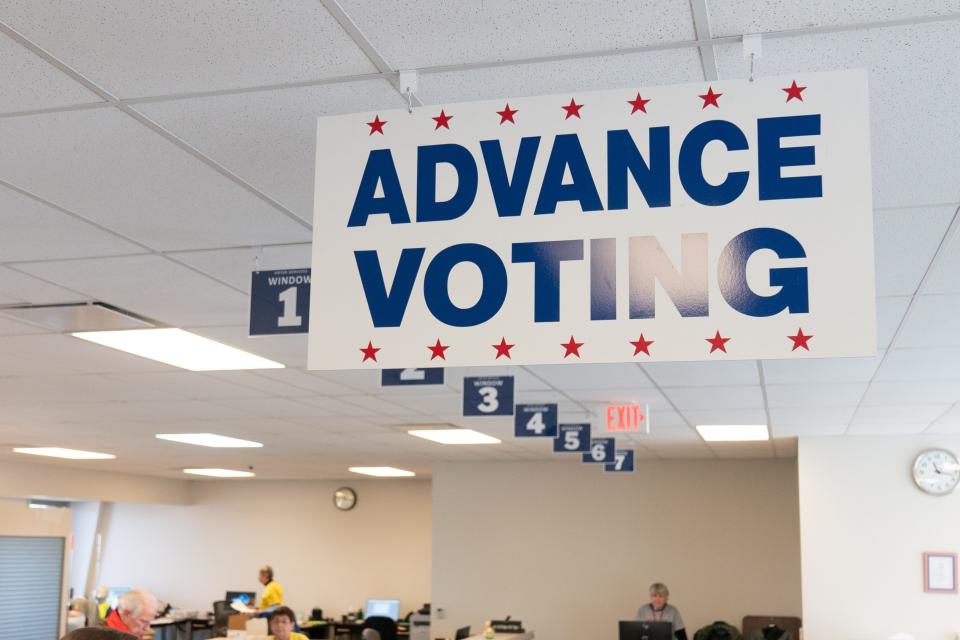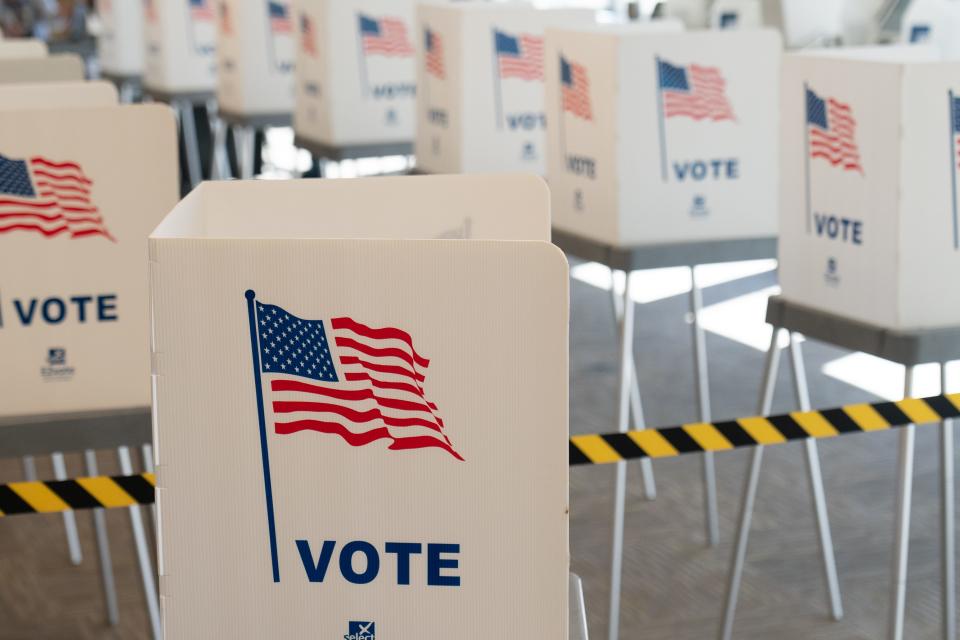Kansas lawmakers consider several election law changes. Here's what passed last week.
Kansas lawmakers advanced several bills on election laws before their Friday turnaround deadline.
The four bills passed by the House last week now head to the Senate. While some got bipartisan supermajority support, one controversial bill did not get enough to override a potential veto.
Advance voting changes
The House passed House Bill 2512 in a 97-23 vote.
Under the bill, in-person advance voting would no longer be offered on the Monday before a Tuesday election, starting in 2025, though local officials could make exceptions. Currently, the advance in-person voting period closes at noon the Monday before an election.
The bill, starting this year, would allow in-person advance voting on both the Saturday and Sunday of the weekend before election day. Election offices would be required, at a minimum, to have four hours on such Saturdays. Currently, election offices are allowed but not required to be open on the Saturday before an election.

The stated intent was to reduce the burden on election officials from Monday voters.
"I understand the problem of people coming in at the last minute, adding to all that needs to be done in preparation for election day," said House Minority Leader Vic Miller, D-Topeka.
But Miller also proposed an amendment to allow anyone who votes by mail to opt into the permanent advance voter list, meaning they would no longer have to apply again ahead of every election. He said county election officers support his idea because it would make their jobs easier and reduce their paperwork.
Rep. Paul Waggoner, R-Hutchinson, said the state should not expand the permanent advance voter list.
"That would be a total mistake as far as keeping our election process clean, transparent and the notion of trying to create an environment where you do have complete voter confidence in the integrity of elections," he said.
Speaker Pro Tempore Blake Carpenter, R-Derby, said it could potentially lead to issues at rental properties from which voters have moved.
"If we pass this today, we are going to allow for these advanced ballots to continue to go to these homes where people might not live anymore. And then at that point, we have to trust that those people who are there are ethical with those other people's ballots."
Signature verification can't be relied upon, he said, because of an ongoing legal challenge against it.
Rep. Stephanie Sawyer Clayton, D-Overland Park, said it is already a crime for someone else to fill out a ballot, so "we definitely have controls in place."
Republicans rejected Miller's amendment in a 37-83 vote.
Making it harder for independents to run for office
The House also passed House Bill 2516 in a 68-52 vote, which would make it more difficult for an independent candidate to get on the ballot for statewide office by roughly quadrupling the number of signatures needed.
The bill would change the petition signatures required from an independent candidate to get on the ballot from 5,000 to at least 2% of the total votes cast in the preceding election. That would mean more than 20,000 signatures required if an independent wanted to run for governor in 2026.
"Any credible and serious independent candidate should be able to collect the signatures required in this bill," said Rep. Les Mason, R-McPherson. "And that's the simple goal, to make sure that the independent candidate is serious and credible, not motivated by ego or personal vendetta."
Mason cited the failed 1930 and 1932 campaigns of independent candidate John Brinkley, who ran after his medical license was revoked, as reason for the bill. But he also acknowledged that independents have also run in recent gubernatorial elections and noted that "in Kansas' three most recent gubernatorial elections, the declared winner received less than a majority of the vote."
Rep. Brandon Woodard, D-Lenexa, said it "feels a little retaliatory" toward Dennis Pyle, and independent senator from Hiawatha who ran for governor in 2022.
Pyle has frequently been blamed by Republicans for Derek Schmidt's narrow loss to Gov. Laura Kelly, even though Kelly's margin of victory over Schmidt was by more votes than Pyle got.

Requirements for poll workers changed
A bill would allow military members, dependents of military members and college students to volunteer in areas that are not the same as where they are registered to vote.
House Bill 2616 passed the House on a vote of 93-27. The bill's carrier, Rep. Jeff Underhill, R-Junction City, explained that the expansion toward military families and college students is because those demographics are often registered to vote outside of their current precinct.
"County election clerks struggle to find additional reliable workers to run elections," Underhill said. "Further, nearly 60% of all poll workers are aged 61 and older."
The House Election Committee amended the bill to add a qualification that poll workers must be citizens of the United States. The bill was uncontroversial in committee, garnering no testimony in opposition, and a ranking Democratic member of the House asked for it to be passed on the House floor.
"As we talked about in our caucus, if you're pro more poll workers vote yes," Woodard said, "and if you don't want Kansans serving as poll workers vote no."
False representation of poll workers
A bill clarifying language from a 2021 bill that criminalizes impersonating a poll worker passed the House on an 85-35 vote.
House Bill 2618 would add that whoever is charged with impersonating a poll worker must be proven to have acted with the intention to deceive someone. The 2021 law is currently tied up in the Kansas Supreme Court, with opponents arguing that the law is written vaguely enough that it could stop volunteers from participating in voter registration drives over fears of prosecution.
"This is hopefully going to remove some vagueness and make it more clear how we want this bill to be applied," said Rep. Leah Howell R-Derby.
Woodard questioned whether the bill actually makes the law clear. He said it doesn't cite specific actions that are illegal and that it doesn't specify what intent means. He asked the House to reject it while the court makes a decision.
"This issue was before the Kansas Supreme Court and I feel like this bill is an attempt to do Attorney General Kobach's job for him," Woodard said.
This article originally appeared on Topeka Capital-Journal: Kansas House sends four bills on election laws to Senate

